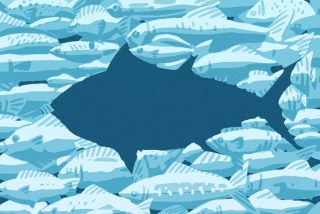Tuna Firm OKs Inspection for âDolphin-Safeâ Methods
Unicord, the Thailand-based owner of San Diego-based Bumble Bee Seafoods, on Friday agreed to fund a dockside observer at its Thailand canneries in an attempt to disprove recent allegations that its workers process tuna that are not caught by âdolphin-safeâ methods.
In response, a San Francisco-based environmental group that has accused Unicord of processing tuna that is not dolphin-safe, questioned whether an observer would be able to ensure that the company processes only tuna that is caught through methods that donât injure or kill marine mammals.
âThe money for monitoring is something weâve been calling for but, once again, (Unicordâs) stated policy is not entirely dolphin-safe,â said David Phillips, executive director of Earth Island Institute. âUnicord continues to buy tuna caught by drift netsâ that cause dolphins to be maimed or killed, Phillips said.
Mark Koob, president of Bumble Bee Seafoods, who spoke to reporters before a Chamber of Commerce luncheon at the Westgate Hotel, denied that Bumble Bee markets tuna not caught in a dolphin-safe manner. More than 2 dozen protesters representing Earth Island Institute and a handful of other environmental groups protested outside while Koob spoke to the chamber group.
Koob said the decision to fund a monitor, who would be selected by environmental groups, was made by Unicord President and owner Dumri Konantakiet. Unicord processes much of the tuna that Bumble Bee markets in the U.S. Konantakiet also pledged to make dolphin-safe documentation provided by fishermen available to âany responsible environmental group,â Koob said.
The dispute between Earth Island Institute and Unicord and Bumble Bee dates back to April, when Bumble Bee, San Diego-based Van Kamp Seafood, which packs Chicken of the Sea brand tuna, and StarKist Seafood Co., a Long Beach-based subsidiary of H.J. Heinz, agreed to can only tuna that was caught through dolphin-safe methods. The pledge covered not only tuna sold in the U.S., the worldâs largest tuna market, but elsewhere in the world.
StarKist and Chicken of the Sea tuna have been dolphin-safe since that announcement in April, according to environmental groups. But, during a Friday press conference, Koob said that Bumble Beeâs canneries were, in some cases, slower to switch over to dolphin-safe tuna because Bumble Bee âfelt a moral and legal obligationâ to honor existing contracts with fishermen who used methods that are more likely to kill marine mammals.
However, the last Unicord cannery switched over to a completely dolphin-safe supply of tuna on July 31, Koob said. Since then, Unicord and Bumble Bee have âcollected documentationâ that proves that the fish are caught by dolphin-safe methods.
More to Read
Inside the business of entertainment
The Wide Shot brings you news, analysis and insights on everything from streaming wars to production â and what it all means for the future.
You may occasionally receive promotional content from the Los Angeles Times.









